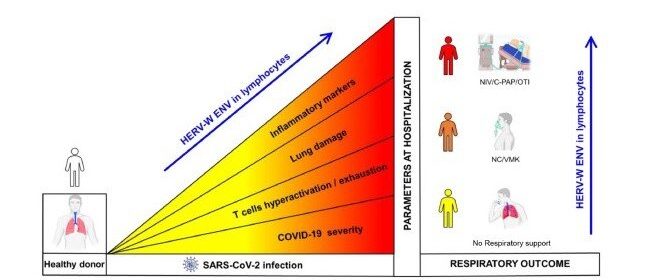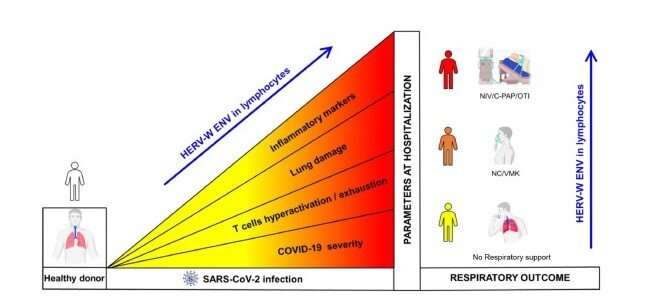Easily-detected biomarker predicts clinical progression of COVID-19, respiratory outcomes

Researchers at the University of Rome Tor Vergata have demonstrated for the first time an elevated expression of the HERV-W ENV protein in the blood cells of COVID-19 patients, particularly in T-lymphocytes, important cells of the immune response against viruses and bacteria. In COVID-19 patients, the protein was correlated to inflammation and alteration of the activation and exhaustion of the immune response.
Furthermore, the expression of the protein reflects the respiratory outcome of patients during hospitalization, thus suggesting the role of HERV-W ENV in the pathogenesis and disease evolution. The study, titled “Evidence of the pathogenic HERV-W envelope expression in T lymphocytes in association with the respiratory outcome of COVID-19 patients,” was recently published in the journal EBioMedicine of The Lancet group.
The study was directed by Dr. Claudia Matteucci, researcher at the Chair of Microbiology and Clinical Microbiology of the Department of Experimental Medicine at the University of Rome Tor Vergata, and performed in close collaboration with the Policlinic of Tor Vergata, in particular with Prof. Sandro Grelli, head of the Virology Unit, with Prof. Massimo Andreoni head of the Infectious Diseases Clinic. The research was supported by GeNeuro—Innovation, a Biotech company dedicated to research in the field of human endogenous retroviruses (HERVs).
Human endogenous retroviruses (HERV) are retroviral sequences derived from ancestral infections and constitute 8% of the human genome. Recent studies have shown that the activation of HERV, triggered by external stimuli such as viral infections, contributes to the onset and progression of several inflammatory and neurological diseases. In particular, their activation has been associated with multiple sclerosis, type 1 diabetes and rheumatoid arthritis, which are often comorbidities in patients who develop severe forms of COVID-19.
Dr. Matteucci said, “The activation of HERV-W ENV induced during SARS-CoV-2 infection that we have observed in the lymphocytes of hospitalized patients contributes to the processes of hyper-inflammation and immune deregulation that underlie the severity of COVID-19. Understanding the mechanisms behind disease severity is critical for the development of effective treatments. The identification of the association between the presence of HERV-W ENV and inflammatory and immune dysfunction in COVID-19 opens for further study on the role of ENV protein as a potential therapeutic target.”
Prof. Andreoni said, “Concerning the severe form of COVID-19 disease, there are currently few therapeutic options available to control the dysregulated response to SARS-CoV-2 infection, mostly ineffective in reducing mortality rates.”
Source: Read Full Article
